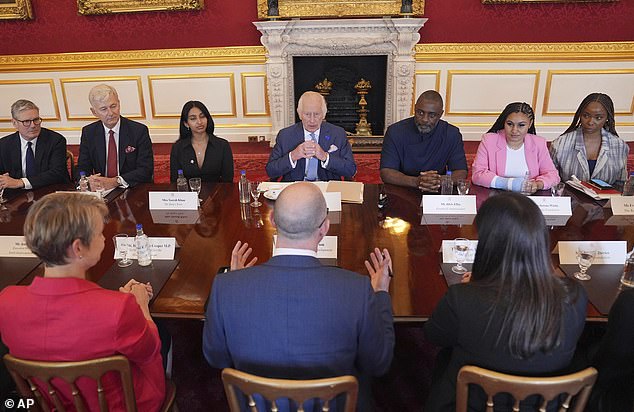Ahead of the King's Speech on Wednesday, the Government said it will put economic growth at the heart of its legislative agenda.
More than 35 bills are expected to be announced as Labour seeks to maintain momentum and define its first 100 days in office as a period of positive progress.
Fiscal discipline
The Government has promised legislation to toughen spending rules which it said will "ensure economic growth" and prevent a repeat of the chaos caused during Liz Truss's stint as prime minister.
A new Bill is expected to strengthen the role of the economic watchdog, the Office of Budgetary Responsibility, to guarantee that major fiscal decisions are properly scrutinised.
Further devolution
The Government plans to "empower regions" by devolving further powers to local and regional leaders "who know what is best for their areas".
Mayors and councils are expected to be handed more control over skills, energy, planning and transport, including bus routes and fares.
Local government, including mayoral combined authorities, have long called for new powers and flexibilities to drive growth and improvements.
National wealth fund
The Government has said the King's Speech will include legislation to enact announcements made last week. These include the launch of the national wealth fund, which is designed to attract billions in private sector investment to support UK growth.
Clean energy boost
The Government has also referenced the new "mission control centre" which is intended to drive the plan to provide Britain with cheaper and clean power by 2030.
In terms of legislation, the Government will likely look to begin the process of establishing the state-owned GB Energy, which will oversee investment in big projects facilitating the decarbonisation of the electricity grid.
Planning and infrastructure
The Government is exploring reform of the national planning policy framework, including restoring mandatory housebuilding targets for local authorities, as part of the drive to build 1.5 million homes over five years.
Housebuilding targets will mean allowing building on some land currently designated as green belt.
There may also be measures aimed at speeding up approvals for major infrastructure projects.
Revitalising Rail
Rail reform is a key priority, with the Government planning to renationalise nearly all passenger rail services within five years.
A new public body established by primary legislation is expected to inherit existing rail contracts when they expire.
Skills push to focus on big business
The Government is planning a skills bill, according to the Times. This will replace the apprenticeship levy paid by big businesses with a "growth and skills" levy, the newspaper said.
The bill will also reportedly convert further education colleges into specialist technical colleges.
Border security
The Government is preparing early legislation to introduce new counter terror-style powers and measures to tackle organised immigration crime.
This will be a key element of the new UK Border Security Command, which will draw together work across the National Crime Agency, intelligence agencies, police, Immigration Enforcement and Border Force.
Reform for renters
Labour is set to introduce a strengthened version of the Renters Reform Bill, which fell after Rishi Sunak called the General Election.
The revised bill is set to retain a ban on no-fault evictions. The measure was included in the last government's legislation, but implementation was set to be a delayed.
Other measures to boost renters' rights, including the scope for challenging high rents and poor standards, are likely.
Crime and policing
An expected crime and policing bill will reportedly include a ban on zombie-style knives.
Other measures could include a new type of anti-social behaviour order and stronger penalties for shoplifting.
Labour has also said it will introduce a "neighbourhood policing guarantee" which will establish a named officer responsible for tackling anti-social behaviour in each community.
Workers' rights
Labour's landmark bill to boost workers' rights, referred to as a "new deal for working people", is expected to be confirmed on Wednesday.
Measures are set to include a ban on zero-hour contracts, giving workers' rights immediately on starting a job and a crackdown on the practice of fire and rehire.
Help for mental health
Labour has promised to reform the Mental Health Act, with the Prime Minister looking to overhaul current arrangements which have left some 120,000 children waiting six months or more for treatment following a referral.
As well as planned improvements to the Act, the Government is aiming to provide 8,500 specially-trained mental health staff, establish support in all schools and provide access to early intervention services in every community.
Eradicating smoking
Labour is expected to resurrect the previous government's proposed ban on anyone born after 2009 buying tobacco.
The bill had cross-party support, but ran out of time at the end of the last parliament.
Martyn's Law
Labour has promised to bring forward Martyn's Law, which is focused on improving security at public venues and named after Manchester Arena bombing victim, Martyn Hett.
A bill, which would have required venues to prepare for terrorist attacks, was dropped in May.
In opposition, Sir Keir Starmer said Labour would introduce the law as a priority.
Constitutional reform
Reports suggest Labour will introduce legislation on a manifesto commitment to reform the House of Lords, including compulsory retirement of peers at 80 and the removal of hereditary peers.
Other potential moves could include an extension of the right to vote to 16-year-olds and proposals to reorganise parliamentary constituencies based on population, rather than registered voters.
Football governance
Labour's manifesto promised to establish an independent regulator of football in England, which was a policy position of the previous government but not enacted.
Acting on AI
The Government is expected to introduce a bill to create binding rules to govern the development of artificial intelligence, according to the Financial Times.The legislation will enhance legal safeguards, with a focus on general purpose technology that underlines AI products such as ChatGPT, the newspaper said.































































































































































































































